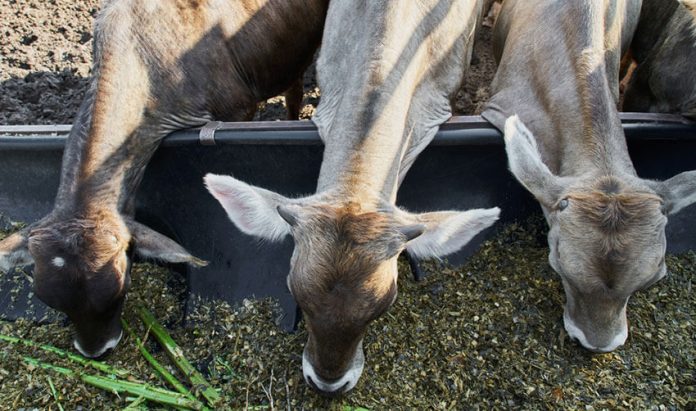A proposed law intended to clamp down on the use of a steroid-like synthetic drug to fatten cattle and other livestock has reached the federal Senate.
Giving clenbuterol to farm animals is illegal, but politicians and scientists agree that it’s an open secret that that drug is used in Mexico’s ranching sector, according to a report by the newspaper El País.
A bill that would reform the Animal Health Law to stipulate greater vigilance of the sector was presented in Congress in 2018 and has finally been passed to the upper house for revision. The outcome of the Senate’s consideration of the proposed law is unclear, El País said.
It seeks to mandate increased supervision of ranches, slaughterhouses and meat distribution centers via collaboration between the ministries of Agriculture and Health. The objective is to sanction anyone guilty of using clenbuterol to fatten farm animals as well as people or companies that have contact with such animals at other points along the supply chain.
Between 2002 and 2017, only four sentences were handed down for using the drug to promote weight gain in cattle, according to the Federal Judiciary Council.
Morena party Senator Nancy Sánchez, a leading proponent of the proposed law, told El País that a lot of meat contaminated with clenbuterol comes out of “clandestine abattoirs” in rural and suburban areas.
The drug is also given to pigs and poultry, she said, explaining that consumption of contaminated meat has a negative impact on human health.
Inadvertent consumption of clenbuterol is especially harmful to young and elderly asthma sufferers who use that drug to treat the disease because it can cause excessive amounts of it to build up in their bodies, El País said. The drug has also been linked to heart conditions and cancer.
Health problems associated with clenbuterol intoxication have been detected in Jalisco, which El País described as “one of Mexico’s cattle fattening epicenters.”
“The substance is deposited in the flesh of the animal but also in the liver and eyes, and all that is eaten in Mexico,” the newspaper said.
Mexican athletes including boxer Saúl “Canelo” Álvarez have blamed Mexican meat for drug tests they failed when clenbuterol was detected in their urine.

Athletes including American football players were warned in 2016 to mind their meals while in Mexico due to the high risk of inadvertently ingesting beef and chicken containing the drug, while a 2017 study by the National Autonomous University detected clenbuterol in 29 of 433 samples of raw and cooked meat.
José Zorrilla, a livestock researcher at the University of Guadalajara, told El País that the detection of clenbuterol in meat is made difficult by the fact that similar substances, such as zilpaterol, are legally used to fatten animals.
“That really complicates the identification … of clenbuterol, which continues to be used because it’s effective and cheap,” he said.
“Zilpaterol and other substances that aren’t harmful for humans were authorized at the start of the century, but the companies that make it limited sales to ranchers,” Zorilla said.
“… Those who didn’t have access to it sought out alternatives such as clenbuterol. These substances have to be mixed well and controlled in animal feed and specialized teams are needed for that. The companies that sell it [zilpaterol] don’t want the product to be discredited – that’s why they didn’t provide access to all the ranchers, only those who have the technology and sufficient control.”
Zorrilla said the use of clenbuterol is less of a problem in the north of the country than other parts of Mexico.
“The preference for fatty meat in the north has avoided this [practice] to some extent and in those states there is a lot of export [of meat] to the United States, which must have its respective health record,” he said.
Enrique López, an official with the Mexican Association of Meat Producers, played down the clenbuterol problem, but nevertheless acknowledged that up to 30% of Mexican meat sold locally could be contaminated.
He expressed his support for greater vigilance of the industry, as the bill proposes.
“In a corral of 3,000 or 4,000 head [of cattle] they take samples from 60 or 70 animals,” López said, referring to random inspections by agriculture sanitation authority Senasica.
“If that’s not enough, do more inspections. We’ve always asked lawmakers for more funding for Senasica and for sanitary safety in general. And also for [health regulator] Cofepris, which is in charge of [health inspections at] municipal markets,” he said.
Sukarne, a Culiacán-based company that is Mexico’s largest meat exporter, suggested that greater vigilance of its suppliers was unnecessary. It told El País that its meat passes all established health controls, allowing it to ship to the United States, Canada, Asia and Africa.
“Mexican meat that comes from the formal industry doesn’t contain clenbuterol,” the company said in a statement.
With reports from El País
